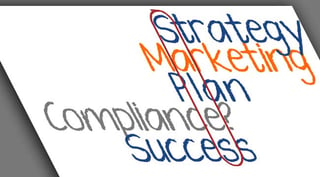 On a recent survey, a DME manager was surprised when I asked about the schedule for their marketing representative so I could set up some time to talk to her. The organization was not being argumentative, but were truly surprised to find me interested in chatting with her about her the marketing she was doing. “She really doesn’t have anything to do with the accreditation process and her work has no impact on accreditation at all”, they explained.
On a recent survey, a DME manager was surprised when I asked about the schedule for their marketing representative so I could set up some time to talk to her. The organization was not being argumentative, but were truly surprised to find me interested in chatting with her about her the marketing she was doing. “She really doesn’t have anything to do with the accreditation process and her work has no impact on accreditation at all”, they explained.
The marketing process in DME actually DOES have implications regarding accreditation. As a “risk area” in compliance, marketing can make or break your company. Just as a successful, appropriate, legal, compliant, and effective marketing process helps you communicate your organization’s capabilities and services to the community, a marketing process that is NOT appropriate, legal, compliant, and effective can get you in trouble with your payers, customers, referral sources, and “the law.”
PS 10—MARKETING & ADVERTISING MATERIALS states that “the organization ensures that the information listed in the advertising and marketing materials correctly reflects the products and services currently offered by the organization in an honest and ethical manner. The organization ensures that only those items and services that are within the scope of services are marketed or advertised to the public”. Think of this standard as the starting point for your marketing plan, any marketing efforts you may consider, and how you advertise your business. While PS 10 is a good starting point, there are other standards that come into play in this area. Be sure to review the following standards and how your organization addresses each one in policy and procedure:
- ORG 2 (COMPLIANCE WITH PERMITS & LICENSES)
- ORG 5 (COMPLIANCE PROGRAM GUIDE)
- ORG 6 (CONFLICT OF INTEREST)
- ORG 7 (ETHICS)
- PRO 5 (DISCLOSURE TO OUTSIDE ENTITIES)
- BC 3 (COMPLIANCE WITH PAYER REQUIREMENTS)
“Honest and ethical manner” is a simple and straightforward phrase, but it contains a lot of positive direction for your organization. Your marketing efforts must comply with law and regulation ranging from anti-kickback statutes to proper billing practices to maintaining appropriate licenses for services within a geographical area. In many cases, your organization’s marketing and sales personnel are the gatekeepers of this compliance and thus, have a lot to do with accreditation.
All but a very small minority of organizations strive to ensure they are marketing in an honest and ethical manner. Avoiding the obvious breaches—things like paying referral sources for new patients-- is easy. However, some of the more nuanced, “gray area” issues can be tricky, and a careless organization can accidently slide into noncompliance.
Here’s a quick checklist of items to audit your organization against. Use it to establish a compliant marketing plan and use it on an ongoing basis to check your existing processes. Review it from time to time to ensure you haven’t strayed from compliance.
- Does our organization orient new sales staff on our compliance program and law & regulation, and do we re-educate from time to time with updates on law and regulation?
- Does our organization understand Stark and anti-kickback statutes and laws and similar regulation and do we carefully follow the law to the best of our abilities?
- Is our marketing literature accurate in terms of locations, hours of operation, services offered, contact info, etc.?
- Does our website list the same locations, hours of operation, services offered, and contact info as our printed literature?
- Have we disclosed all locations including warehouses, equipment storage facilities, and satellites to Medicare, state licensing bodies, and our accreditation provider?
- Is the ownership of our organization accurately conveyed to customers and referral sources?
- Do our contracts with service providers (and contracts we sign to provide services on behalf of other organizations) adhere to law and regulation and pass the “compliance smell test”?
- Have we spelled out our conflict of interest policy to our employees, our officers, and our contracted service providers? Does the policy meet the requirements of our accreditation standards?
- Does our organization have an ethics policy and do we educate staff on the policy?
Finally, here’s some general advice about training sales and marketing staff. In many cases, these staff members have a financial incentive to bring in new referrals that meet billing criteria. Be sure to educate them on law and regulation, as well as billing practices. It is common practice for sales staff to coordinate obtaining prescriptions and Certificates of Medical Necessity (CMN’s) for billing. Make sure they know not only the criteria for reimbursement, but also the letter of the law with regards to what they can and cannot do to facilitate the completion of this important paperwork. Certainly, before new staff is sent out into the field to obtain this paperwork, they need to know what they are allowed to do to facilitate the paperwork’s completion.
Ethical, honest sales and marketing practices are an important part of your organization’s overall compliance. More importantly, these practices not only keep you out of trouble, they also establish your reputation in the local community as an ethical, honest business.


